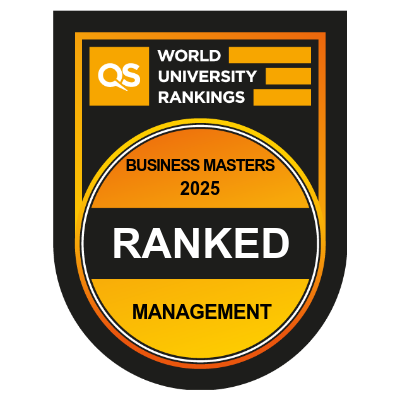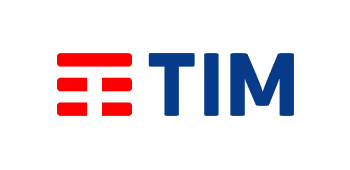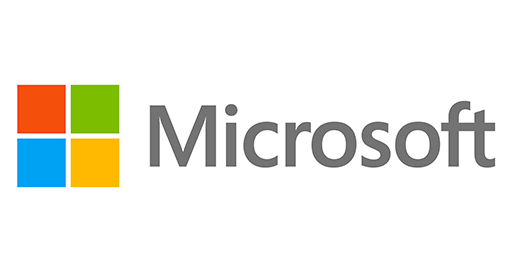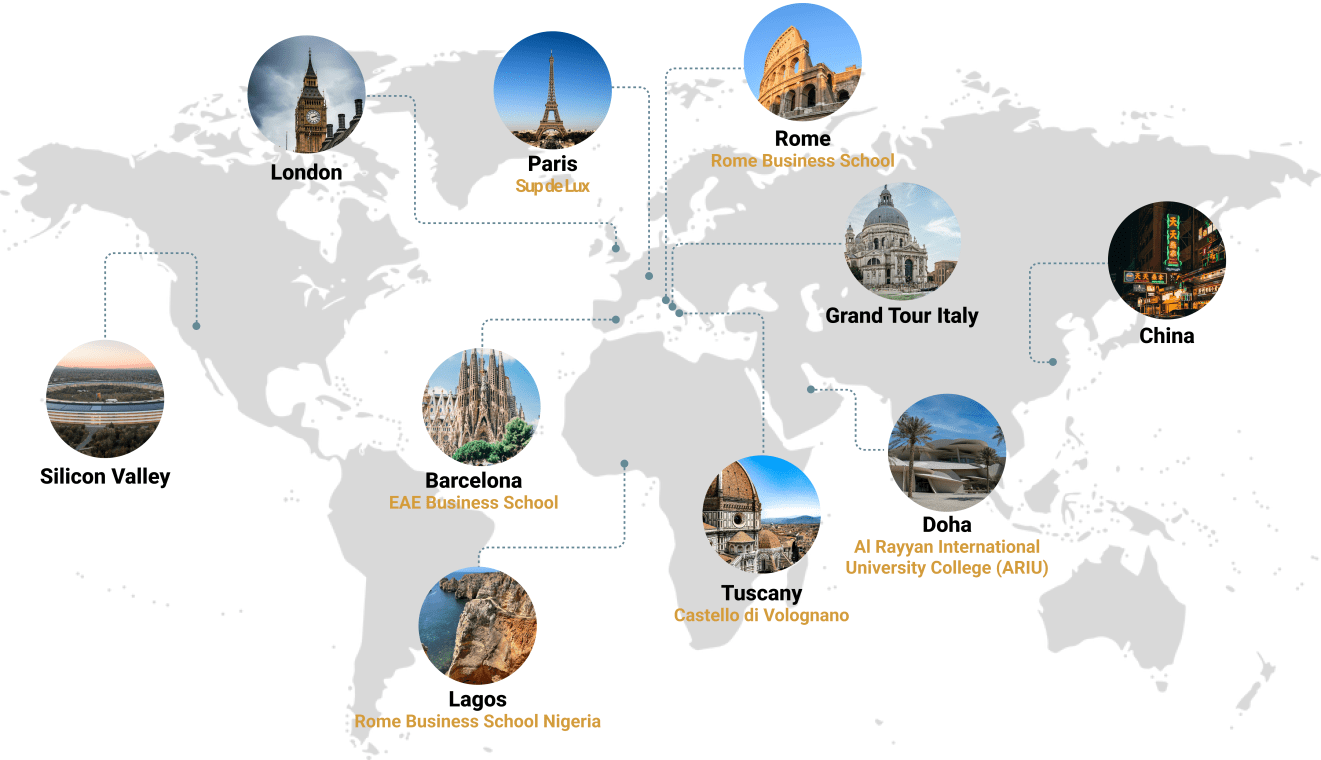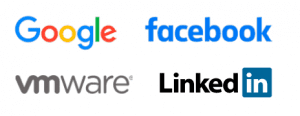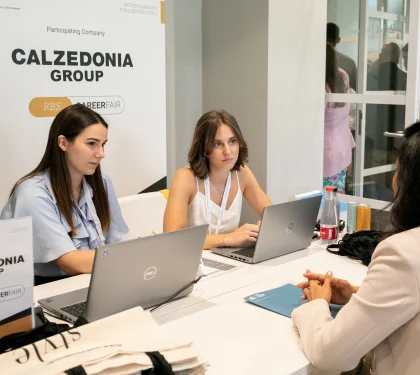During the first module of the Master in Marketing, students will learn how to:
- Managerial Economics
This module aims to prepare students by providing them with the essentials of entrepreneurship and business planning. - Management Accounting for Decision Making
The course focuses on the financial aspects of business decisions giving students an overview of the accounting tools useful and most used for short and long-term decision making such as cost management, budgeting, CVP analysis, and investment appraisal techniques. - Business Strategy
Through this module, students will know how to understand the long-term direction and strategy of a company, and will be able to identify the strategic business units of organizations. - Financial Statement Analysis
This course aims at equipping students with an understanding of financial statements and their usefulness for decision making. - Project & Operations Management
With this module, students will be able to manage projects, examine data and information, and have a diagnostic approach in solving problems. - Marketing: Traditional and Digital
Students will learn the application of marketing principles in organizational decision making. - Human Resource Management
This subject area focuses on strategic human resource issues such as workforce acquisition, development, motivation and retention. - Data Analytics for Managers
This course is designed to equip students with the basic knowledge needed to analyze and interpret large sets of data, to make effective business decisions and strategies.
During the second module, students will learn how to:
1)Global Businesses and Strategic Management
- International Economics
- Corporate Internationalization
- Financial Management
2)Marketing and Brand Management
- International Marketing
- Brand Equity Management
- Product Management in the Digital Age
- On line Marketing & e-Commerce
3)Managing International & Multinational Companies
- Entry strategies in foreign markets
- Joint Ventures and Alliances
- International Business, Law and Taxation
- Entrepreneurship Pathway & Global Start Ups
- Family Business Management: Succession Planning
- What if? (Negotiation, Crisis and Change Management) [Case studies]
4)Data Analytics for Management
- Into the world of Data Analytics
- Data Presentation, Analysis & Evaluation
- Decision and Risk Analysis
5)Strategic Communication in International Markets
- Business Storytelling & PR
- Investor Relations Management
During the third module, students will learn how to:
6) Intercultural Management and Sustainable Businesses
- The Future of the Cross Cultural Management
- The Role of CSR: Business Sustainability and Circular Economy
- Business Ethics and CSR
- Made in Italy in International Markets (The Future of Food, Fashion and Mechanical Industry)
7)Exponential Digital Technologies
- Digital Economy
- Tech Future Business Trends: AI, Blockchain and the Business Impact
- Building ethical and responsible organizations
The goal of Rome Business School is to develop future managers, entrepreneurs, and professionals who are ready to capitalize on the benefits of digitalization, go global, and have a positive impact on society.
Electives are ideal tools for students to improve their employability by focusing on high-demand skills.
- Electives assist students in carving out a niche for themselves and becoming more competitive.
- Electives expose students to courses they might not have encountered otherwise.
- Electives provide a one-of-a-kind curriculum that fosters life and career skills.
- Elective courses are organized in 7 main areasof interest:
Macro Area I
Next Gen Business: Innovation, AI and Digital Growth
- Area 1: Innovation & Growth
- Area 2: AI4 Business: Shaping the Future
- Area 3: Tech & Digitalization
Macro Area II
Global Business Excellence
- Area 4: Industry Business Excellence
- Area 5: International Business
- Area 6: Global Electives with RBS international partner Business Schools
- Area 7: Introduction to preparation for professional certifications
The Rome Business School Practice Lab is where theoretical concepts are put into practice and participants learn through experience.
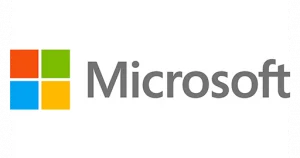
Microsoft managers will lead the Lab, examining various specialist knowledge, working on exercises, and networking with students while sharing their experience and expertise. This Lab is completely run by Microsoft* managers, with whom you will work to develop a product launch strategy and run a virtual company as CEO. The Business Simulation is an innovative and engaging managerial tool that allows the dynamics and logic of a business to be reproduced.
*Partnerships with companies can change over time
The Global Trends lab consists of 2 virtual sessions:
Session 1: How to Find Sources to Identify Global Trends Identify sources and monitor Global trends Deep Dive into the Global World Trends Shaping the World of Today – guest speakers from UN, UNIDO, ILO. Examples of Global Trends:
- The Future of Work
- Ethics of AI and Big Data
- The World in 2030: Future Scenarios
Session 2: Understand the impact of global trends on businesses, and explore ways in which businesses can adapt and transform based on future trends and forward-thinking strategies
You will have the opportunity to demonstrate your abilities by tackling a real-world business challenge at the end of your educational experience. Make use of your skills to identify opportunities and create a truly innovative strategy.
Take on a genuine business challenge. You can work with a small group to develop a marketing strategy for a new business, a strategy to increase online sales, or a loyalty offering for different generations.
Two case studies from two different companies will be assigned to you to put your master’s course knowledge to the test.
Previous years’ experiences
The Practical Challenge:
Assess the impact of Covid on the e commerce strategy, do analysis on the consumer behaviour impact and provide recoomedations for the future ZARA strategy.

The Practical Challenge:
Do analysis on the consumer behaviour impact, market expansion, e commerce, and provide recoomedations for the future strategy of Amazon.


